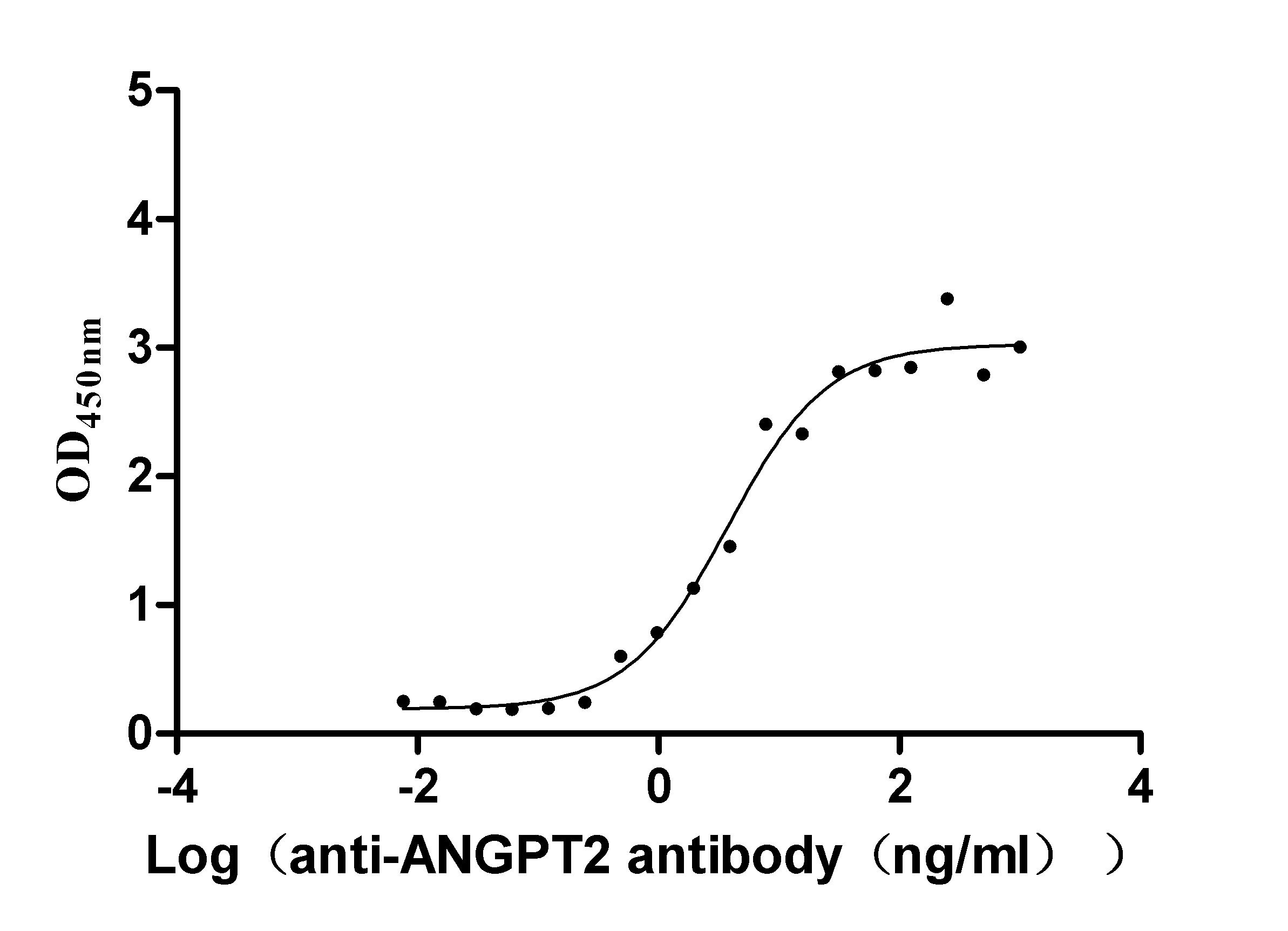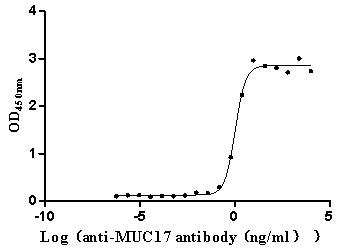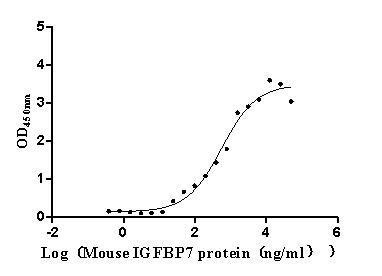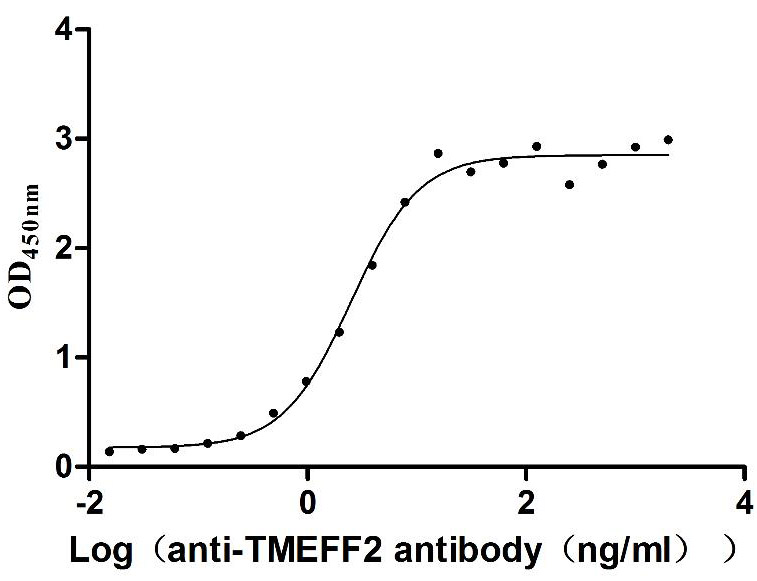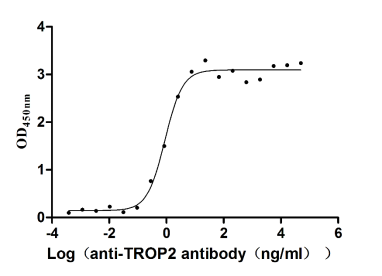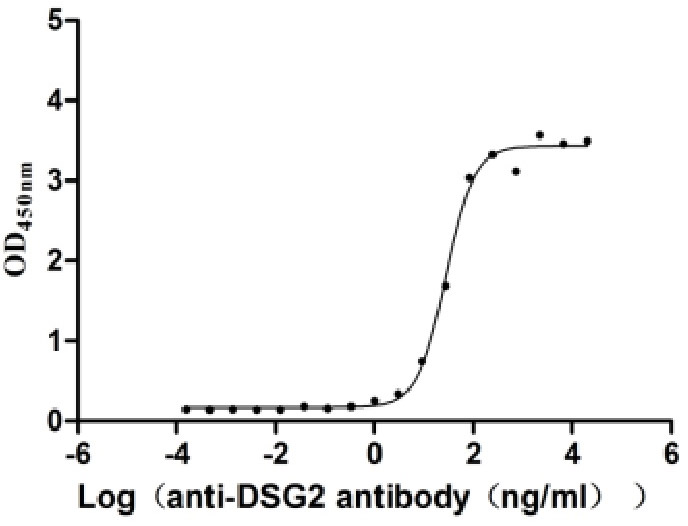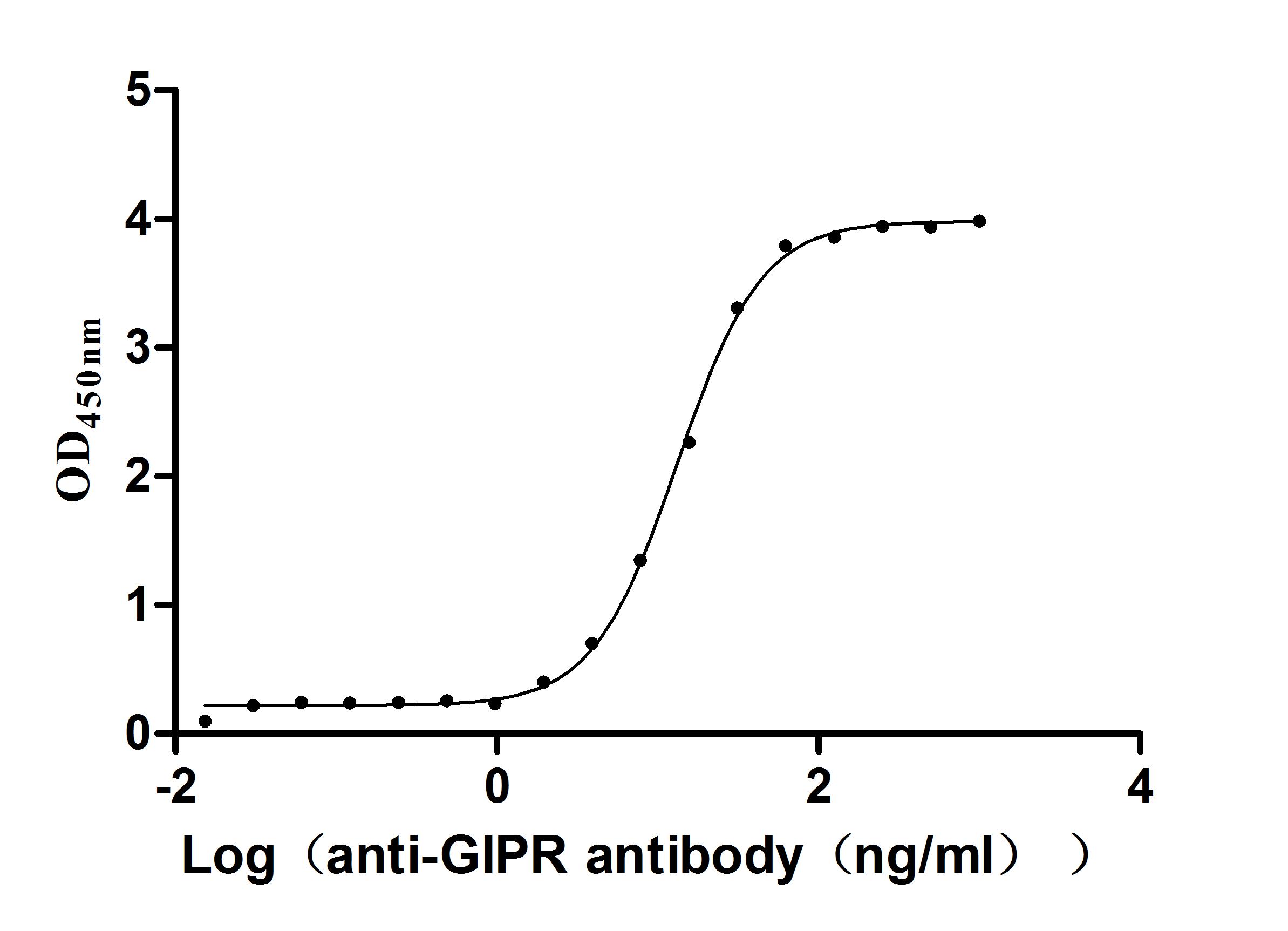Recombinant Human Cell division cycle protein 20 homolog (CDC20)
-
货号:CSB-YP623655HU
-
规格:
-
来源:Yeast
-
其他:
-
货号:CSB-EP623655HU-B
-
规格:
-
来源:E.coli
-
共轭:Avi-tag Biotinylated
E. coli biotin ligase (BirA) is highly specific in covalently attaching biotin to the 15 amino acid AviTag peptide. This recombinant protein was biotinylated in vivo by AviTag-BirA technology, which method is BriA catalyzes amide linkage between the biotin and the specific lysine of the AviTag.
-
其他:
-
货号:CSB-BP623655HU
-
规格:
-
来源:Baculovirus
-
其他:
-
货号:CSB-MP623655HU
-
规格:
-
来源:Mammalian cell
-
其他:
产品详情
-
纯度:>85% (SDS-PAGE)
-
基因名:
-
Uniprot No.:
-
别名:bA276H19.3; Cdc 20; CDC20; CDC20 cell division cycle 20 homolog; CDC20_HUMAN; CDC20A; Cell division cycle 20; Cell division cycle 20 homolog (S. cerevisiae); Cell division cycle 20 homolog; Cell division cycle protein 20 homolog; fizzy; MGC102824; p55CDC
-
种属:Homo sapiens (Human)
-
蛋白长度:full length protein
-
表达区域:1-499
-
氨基酸序列MAQFAFESDL HSLLQLDAPI PNAPPARWQR KAKEAAGPAP SPMRAANRSH SAGRTPGRTP GKSSSKVQTT PSKPGGDRYI PHRSAAQMEV ASFLLSKENQ PENSQTPTKK EHQKAWALNL NGFDVEEAKI LRLSGKPQNA PEGYQNRLKV LYSQKATPGS SRKTCRYIPS LPDRILDAPE IRNDYYLNLV DWSSGNVLAV ALDNSVYLWS ASSGDILQLL QMEQPGEYIS SVAWIKEGNY LAVGTSSAEV QLWDVQQQKR LRNMTSHSAR VGSLSWNSYI LSSGSRSGHI HHHDVRVAEH HVATLSGHSQ EVCGLRWAPD GRHLASGGND NLVNVWPSAP GEGGWVPLQT FTQHQGAVKA VAWCPWQSNV LATGGGTSDR HIRIWNVCSG ACLSAVDAHS QVCSILWSPH YKELISGHGF AQNQLVIWKY PTMAKVAELK GHTSRVLSLT MSPDGATVAS AAADETLRLW RCFELDPARR REREKASAAK SSLIHQGIR
-
蛋白标签:Tag type will be determined during the manufacturing process.
The tag type will be determined during production process. If you have specified tag type, please tell us and we will develop the specified tag preferentially. -
产品提供形式:Lyophilized powder
Note: We will preferentially ship the format that we have in stock, however, if you have any special requirement for the format, please remark your requirement when placing the order, we will prepare according to your demand. -
复溶:We recommend that this vial be briefly centrifuged prior to opening to bring the contents to the bottom. Please reconstitute protein in deionized sterile water to a concentration of 0.1-1.0 mg/mL.We recommend to add 5-50% of glycerol (final concentration) and aliquot for long-term storage at -20℃/-80℃. Our default final concentration of glycerol is 50%. Customers could use it as reference.
-
储存条件:Store at -20°C/-80°C upon receipt, aliquoting is necessary for mutiple use. Avoid repeated freeze-thaw cycles.
-
保质期:The shelf life is related to many factors, storage state, buffer ingredients, storage temperature and the stability of the protein itself.
Generally, the shelf life of liquid form is 6 months at -20°C/-80°C. The shelf life of lyophilized form is 12 months at -20°C/-80°C. -
货期:Delivery time may differ from different purchasing way or location, please kindly consult your local distributors for specific delivery time.Note: All of our proteins are default shipped with normal blue ice packs, if you request to ship with dry ice, please communicate with us in advance and extra fees will be charged.
-
注意事项:Repeated freezing and thawing is not recommended. Store working aliquots at 4°C for up to one week.
-
Datasheet :Please contact us to get it.
相关产品
靶点详情
-
功能:Required for full ubiquitin ligase activity of the anaphase promoting complex/cyclosome (APC/C) and may confer substrate specificity upon the complex. Is regulated by MAD2L1: in metaphase the MAD2L1-CDC20-APC/C ternary complex is inactive and in anaphase the CDC20-APC/C binary complex is active in degrading substrates. The CDC20-APC/C complex positively regulates the formation of synaptic vesicle clustering at active zone to the presynaptic membrane in postmitotic neurons. CDC20-APC/C-induced degradation of NEUROD2 induces presynaptic differentiation.
-
基因功能参考文献:
- we demonstrate that the CDC20-MAD2 complex could also be formed independently of the SAC. Moreover, in prolonged arrest caused by nocodazole treatment, the overall levels of the CDC20-MAD2 complex are gradually, but significantly, reduced and this is associated with lower levels of cyclin B1, which brings a new insight into the mechanism of mitotic "slippage" of the arrested cells. PMID: 28112196
- Cdc20 may be a promising molecular target for chemotherapy. PMID: 29901174
- Long non-coding RNA SPRY4-IT1 promotes cell proliferation and invasion by regulation of Cdc20 in pancreatic cancer cells PMID: 29489909
- Cdc20 functions as an important negative regulator of SMAR1 in higher grades of cancer PMID: 28617439
- Data provide support for the recent structure-based models and functionally dissect three elements of Cdc20 inhibition: sequestration of Cdc20 in the core mitotic checkpoint complex, sufficient at low Cdc20 concentrations; inhibition of a second Cdc20 through the Mad3 C terminus, independent of Mad2 binding to this Cdc20 molecule; and occupancy of the APC/C with full MCC, where Mad3 and Apc15 are involved. PMID: 28366743
- CDC20 gene, related to cell proliferation in protein complex A, might play momentous roles in the initiation and development of consecutive Trauma-Induced Sepsis. PMID: 29642183
- A mitotic phosphorylation site on Cdc20, known to be a substrate of PP2A(B56), modulates APC/C(Cdc20) assembly. PMID: 28404789
- c-Myc is a driver when combined with kRas/Akt3 oncogenic signals in gliomagenesis, whereas Cdc20 overexpression is a passenger PMID: 26993778
- The ABBA-KEN-ABBA amino acid motif cassette holds the Mitotic Checkpoint Complex (MCC) onto the Anaphase-Promoting Complex-Cyclosome (APC/C) by binding the two Cdc20 molecules in the MCC-APC/C complex. PMID: 27939943
- It discuses the roles of Cdc20 in SAC signalling and mitotic exit, describe how the integration of traditional approaches with emerging technologies has revealed new details of Cdc20 functions, comment about the potential of Cdc20 as a therapeutic target for the treatment of human malignancies. PMID: 28202332
- Prostate cancer-derived SPOP mutants failed to interact with Cdc20 to promote its degradation. As a result, SPOP-deficient prostate cancer cells with elevated Cdc20 expression became resistant to a pharmacological Cdc20 inhibitor. PMID: 27780719
- High CDC20 expression is associated with metastatic castration-resistant prostate cancer growth and reduces chemosensitivity . PMID: 27633058
- These results provide novel insight into the mechanisms underlying the aberrant capability of NUP98 oncoproteins to interact with APC/C(Cdc20) and to interfere with its function. PMID: 27097363
- In lung adenocarcinoma patients, overexpression of cell division cycle 20 was significantly associated with bigger primary tumor size, higher MKI67 level, higher DNA ploidy level, and poor prognosis. PMID: 28349831
- CDC20 may have a role in carcinoma of the breast, colon, endometrium, and prostate PMID: 26245990
- Overexpression of Cdc20 may serve as an independent predictor for biochemical recurrence in patients of clinically localized prostate cancer undergoing laparoscopic radical prostatectomy without neoadjuvant therapy. PMID: 26889981
- Results show that CYP1B1 may promote renal cell carcinoma development by inducing CDC20 expression and inhibiting apoptosis through the down-regulation of DAPK1. PMID: 26626260
- The presence of this segment correlates with SAC activity and efficient binding of CDC20 but not of MAD1 to kinetochores. PMID: 26148513
- These results suggest CDC20 is a critical regulator of TIC proliferation and survival, linking two key TIC nodes-FOXM1 and p21CIP1/WAF1-elucidating a potential point for therapeutic intervention. PMID: 25938542
- CDC20 is essential for the in vivo tumorigenicity of glioblastoma stem-like cells. CDC20 is prognostic of overall survival in Proneural subtype glioblastoma patients. PMID: 26074073
- spindle checkpoint release further increases APC/C(Cdc20) catalytic activity PMID: 25673878
- CDC20, MAD2 and Aurora-B protein expression are associated with chromosomal abnormalities and poor prognosis in patients with myelodysplastic syndromes. PMID: 25637637
- Results show that increased expression of CDC20 was demonstrated to be associated with the development and progression of hepatocellular carcinoma. PMID: 25069850
- The master cell cycle regulator Cdc20 regulates ciliary length and disassembly of the primary cilium. PMID: 25139956
- the mitotic checkpoint complex (MCC) can inhibit a second CDC20 that has already bound and activated the APC/C; the MCC inhibits active APC/C and this is essential for the spindle assembly checkpoint PMID: 25383541
- MAD2 and CDC20 overexpression was increased in high-grade squamous intraepithelial lesions and squamous cell carcinomas, suggesting their involvement in the initiation of cervical cancers. PMID: 25083970
- excess E2F1 due to Rb inactivation recruits the complex of Cdc20 and the anaphase-promoting complex/cyclosome to deregulate the expression of UBCH10 PMID: 25368385
- IR motif integrity is particularly important for stable binding to the APC/C. PMID: 24464857
- CDC20 upregulation was associated with aggressive progression and poor prognosis in gastric cancer. PMID: 24551295
- high Cdc20 and securin immunoexpression identified a patient subgroup with extremely short, on average 2.4 years, breast cancer survival and triple-negative breast cancer subtype. PMID: 24853182
- Mad2, the kinetochore localization of Cdc20, is disrupted in Chk1 depleted cells. PMID: 24747134
- These results reveal an important role for APC(Cdc20) in governing apoptosis, strengthening the rationale for developing specific Cdc20 inhibitors as effective anticancer agents. PMID: 24871945
- CDC20 is increased in patients with colorectal cancer with poor prognosis PMID: 23758705
- increased expression of CDC20 and MAD2 is related to poor prognosis of urothelial carcinoma of the human bladder PMID: 23995871
- PHF8 is regulated by APC(cdc20) and plays an important role in the G2/M transition. PMID: 23979597
- Geminin is a target of the spindle checkpoint and APC/C(Cdc20). PMID: 23775192
- phosphorylation on CRY-box by Polo-like kinase-1 is required for Cdh1-dependent degradation of Cdc20 during somatic cell cycle PMID: 23643811
- High CDC20 expression is associated with cervical cancer. PMID: 23405241
- Nek2A binds with high affinity to apo-APC/C and is degraded by the pool of Cdc20 that avoids inhibition by the spindle assembly checkpoint. PMID: 23288039
- The crystal structures of human Cdc20 alone or bound to a BubR1 KEN box, is reported. PMID: 23091007
- APC/C(Cdc20) or APC/C(Cdh1) complexes regulate RAP80 stability during mitosis to the G(1) phase, and these events are critical for a novel function of RAP80 in mitotic progression. PMID: 22426463
- Data identify Cdc20, USP44, and Wee1 as relevant Fcp1 targets. PMID: 22692537
- Aberrant CDC20 expression may play an important role in pancreatic ductal adenocarcinoma tumorigenesis and progression and may thus be useful as a marker of disease progression and prognosis and as a therapeutic target. PMID: 22475564
- CDC20-mediated degradation of conductin regulates Wnt/beta-catenin signalling for maximal activity during G1/S. PMID: 22322943
- The binding of p31(comet) to Mad2 in the mitotic checkpoint complex may trigger a conformational change in Cdc20 that facilitates its phosphorylation by Cdk, and that the latter process may promote its dissociation from BubR1. PMID: 22566641
- both p31(comet) and ubiquitination of Cdc20 are critical mechanisms of checkpoint inactivation. They act redundantly to promote Mad2 dissociation from Cdc20. PMID: 21937719
- These findings expand our knowledge of both Sp100 and Cdc20 as well as their role in ubiquitination. PMID: 22086178
- Anaphase promoting complex subunit 15(APC15) mediates the constant turnover of CDC20 and mitotic checkpoint protein complexes, allowing the spindle checkpoint assembly to respond to the attachment state of kinetochores. PMID: 21926987
- Spindle assembly checkpoint protein Cdc20 transcriptionally activates expression of ubiquitin carrier protein UbcH10. PMID: 21454660
- These data suggest that APC/C(Cdc20) specifically targets E2F1 for degradation in early mitosis and reveal a novel mechanism for limiting free E2F1 levels in cells, failure of which may compromise cell survival and/or homeostasis. PMID: 20948288
显示更多
收起更多
-
亚细胞定位:Cytoplasm, cytoskeleton, microtubule organizing center, centrosome. Cytoplasm, cytoskeleton, spindle pole.
-
蛋白家族:WD repeat CDC20/Fizzy family
-
数据库链接:
HGNC: 1723
OMIM: 603618
KEGG: hsa:991
STRING: 9606.ENSP00000308450
UniGene: Hs.524947
Most popular with customers
-
Recombinant Dog Angiopoietin-2 (ANGPT2) (Active)
Express system: Mammalian cell
Species: Canis lupus familiaris (Dog) (Canis familiaris)
-
Recombinant Human Epithelial discoidin domain-containing receptor 1 (DDR1), partial (Active)
Express system: Mammalian cell
Species: Homo sapiens (Human)
-
Recombinant Human Mucin-17 (MUC17), partial (Active)
Express system: Mammalian cell
Species: Homo sapiens (Human)
-
Recombinant Mouse Complement component C1q receptor (Cd93), partial (Active)
Express system: Mammalian cell
Species: Mus musculus (Mouse)
-
Recombinant Human Tomoregulin-2 (TMEFF2), partial (Active)
Express system: Mammalian cell
Species: Homo sapiens (Human)
-
Recombinant Human Tumor-associated calcium signal transducer 2 (TACSTD2), partial (Active)
Express system: Mammalian cell
Species: Homo sapiens (Human)
-
Recombinant Human Desmoglein-2 (DSG2), partial (Active)
Express system: Mammalian cell
Species: Homo sapiens (Human)
-
Recombinant Macaca Gastric inhibitory polypeptide receptor(GIPR), partial (Active)
Express system: yeast
Species: Macaca fascicularis (Crab-eating macaque) (Cynomolgus monkey)


